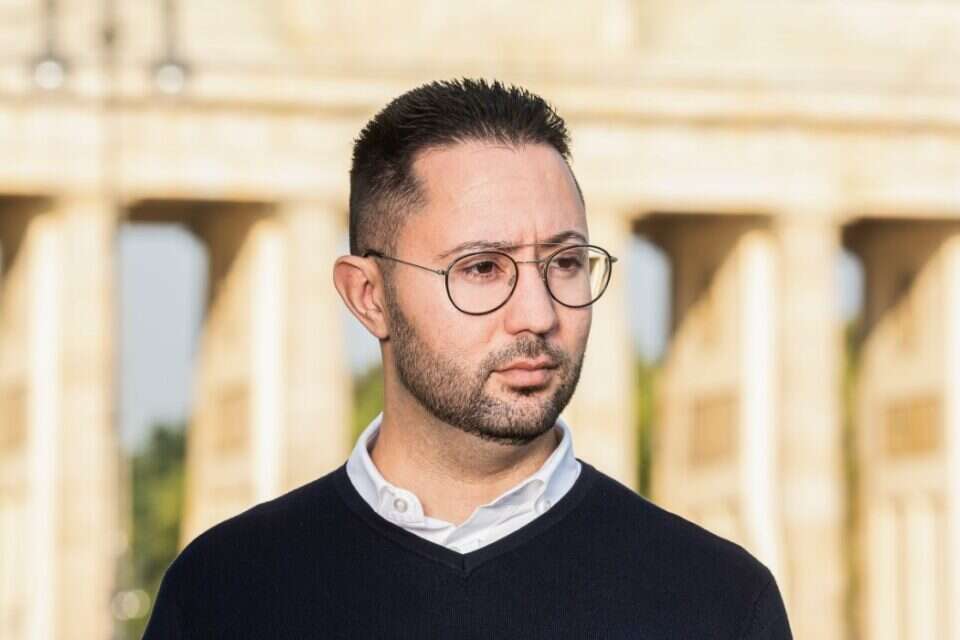Salah a-Din Kuban represents the new face of Germany. He was born in Germany 34 years ago to Kurdish parents, "guest workers", who immigrated from Turkey. Eleven years ago, he joined the ranks of the Conservative Christian-Democratic Party - which still serves as the ruling party in Germany, but could lose power in the general election to be held this coming Sunday. He recently published a book, "The Voluntary Sunset of Germany," in which he analyzes with a sharp chisel the many problems of his homeland, as only a person who has experienced firsthand the consequences of an identity crisis going through a European power suffering from severe schizophrenia can do: Leading role in the international arena. On the other hand, she is afraid of such a possibility and sees in every spark of patriotism the revival of the demons of the not-too-distant past.
In his book, Cuban calls for the development of healthy German patriotism, without which Germany would not be able to absorb its many immigrant communities and in its absence only internal tensions between parts of contemporary German society would be exacerbated. Cuban also calls for a renewed commitment to conservative values, which in the eyes of many conservatives was lost during Merkel's rule. Kuban talks about the need to strengthen the alliance with Israel and to refresh the culture of remembrance, which will also allow the public of immigrants in Germany to connect to the history of the country in which they live. If the left comes to power this coming Sunday, it will wish in the ranks of the Conservative Party in Germany a poignant ideological mental account, in which the positions that Salah a-Din represents will play an important role.
"As a member of the Christian Democratic Party, are you afraid of the results of the upcoming general election?" I ask Cuban.
"I think the consequences will be difficult for conservatives and Germany," he says.
In the case of a left-wing coalition, which will include the Social Democrats, the radical left and the Greens, there will be cause for concern.
The option of a government with members of the Social Democrats, the Greens and the Liberals would not be an optimal solution either.
"Without the presence of the Christian Democrats in government, I fear that Germany will stagnate or be dragged into a left-wing policy of not knowing where it will lead us and what its consequences will be."
If there is indeed a new "left wave" in Germany in the upcoming elections, how can this be explained?
After the "refugee crisis" in 2015, Germany changed greatly and the Christian Democrats lost some of their voters.
Mainly because of the fundamental issue of the sense of loss of personal security.
Added to this was the question of the leadership of the party, the decision on which took a long time.
First they elected Anger Kramp-Kernbauer (now the defense minister, resigned about a year ago due to public unpopularity, AB), then came the party conference where Armin Lasht was appointed party leader, and then began the confrontation over the Conservatives' candidacy for chancellor between him and Marcus Zoder. , The head of the Christian Socials and the head of state of the province of Bavaria, which ended in the victory of Lasht.
For about two years the party has dealt almost exclusively with the issue of who will lead it.
At the same time, the academic and media scandals, which affect public discourse, have greatly advanced the left and see the results of it in polls.
Immigration crisis in Germany, Photo: AFP
Germany can afford in the current conditions, especially economically, an experiment of a left-wing government?
I think such a thing will have fatal consequences, especially when it comes to the Greens' climate conservation policy.
Implementing their proposed policies will lead us to crisis and recession.
One has to of course see if they have implemented the things they are talking about.
But, that's the wrong direction.
One of the reasons why there can be no right-wing majority in Germany today is the boycott of the Alternative for Germany party. Is this party really that dangerous?
"Alternative to Germany" has become a political reality in Germany. They are stronger in the eastern regions of Germany. We have no cooperation with them, just as there is no cooperation with the Di Linke, the far-left party. These are two extremist parties, which are partly under the surveillance of the German GSS. I think that with Merkel's departure, the "alternative" will lose some of its electorate, since this party has benefited greatly from the hatred of Merkel. I estimate that they will continue to be established in East Germany, but will lose their power in the West. They will not disappear, but they pose a problem that causes damage to Germany's internal peace and image. They are not Nazis. There is a current in this party that shares the nationalist worldview, but they are not Nazis. This would be a mistaken historical diagnosis. They have problems with German history. Inflation using the term "Nazi" is not good for Germany. These nicknames are unrelated to reality. The "alternative" can be fought politically. But comparisons to the Nazis do not help.Hitler should be left in history and not seen in various places in contemporary politics. Everything that is right-wing today is immediately defined as extreme right-wing, and that is simply not true. There are democratic right-wingers.
Do you share the assessment that the Christian Democrats have lost their conservative characteristics under Angela Merkel?
I do not agree with this statement.
However, party conservatives are unhappy with the political developments in recent years.
The other two camps in the party - the social camp and the liberal camp - are the ones that have dominated the tone for the last 20 years.
And yet, there are more conservatives in the party.
We have indeed lost our value compass somewhere and we need to get back to it.
On patriotic issues, security, immigration policy people expect from us clear positions and these have been lacking in recent years.
German Chancellor Merkel, Photo: Photo: AP
Angela Merkel, who kept the Christian Democrats in power for about 16 years, was a gift or a disaster for the party?
She achieved many things for Germany.
It turned Germany into a modern country.
When she was appointed chancellor there were five million unemployed in Germany, the number had dropped significantly.
Germany has become an important country in the European Union and has taken on more responsibility.
Merkel has dealt with a great many crises - crises in the European Union, the international financial crisis, the refugee crisis, the corona crisis.
More than she initiated, she responded to events.
I think she had a very hard time.
The international arena has also changed.
We have a difficult system of ties with Russia - partly because of the invasion of Georgia in 2008 and the invasion of Ukraine in 2014.
Germany has always tried to mediate, but without much success.
What is it like to be for a person like you, with an immigrant background from a Muslim country, to be a member of a party that includes the word "Christian"?
Christianity is one of the fundamental values of the party, but there are Muslim and Jewish Germans in its ranks today.
It is clear that the party needs to open itself up more and become more diverse depending on the composition of German society.
It needs to absorb more conservative Muslims into its ranks.
There are many Muslims who are conservative.
I had my own challenging experiences.
Still, it is easier in the party for someone named Thomas than for someone named Salah a-Din.
But, there are many party members, who support openness.
In the other parties in Germany, Germans of Iranian, Turkish, and Kurdish descent are seen in senior positions. The Social Democrats promote senior German positions of "Palestinian" origin. Among Christian Democrats this is not happening yet.
That's right, unfortunately.
There are very few people with an immigrant background who have reached senior positions.
The discussion about what is German and what is not German should be initiated.
The Christian Democrats have pretty much refrained from participating in this debate.
Germany is today a country of immigration.
In this situation, how do we define what is "German"?
Among the Christian Democrats, Germans regarded Germanism as a historical product and did not see people with a German immigrant background.
This is not the right approach, when looking at German society today.
And there is a need for an open discussion on this issue.
Immigrants from the Middle East on the Hungarian border // Photo: Gettyimages,
Immigration to Germany began with "guest workers" from Italy, Yugoslavia, Spain, and Turkey. West Germany has not developed a proper conception for the absorption of these immigrants. They remained closed in their world. They were not even provided with German language courses. The "guest workers" did not leave, but stayed here. And there was still no desire on the part of the Germans to absorb them. Over time, these immigrants were joined by refugees from various wars - starting with the Lebanese refugees in the 1970s. And even in their case nothing was done to absorb them. We see the result in crime gangs - a very common phenomenon among this population group. This development could have been prevented. Today they are trying to conduct an integration policy for Syrian refugees - language lessons, learning values. But, in the end it is not possible to require people to be absorbed in something that is not at all clear what it means. If there is no definition of what it means to be German,How can I be absorbed here? In what patriotism are we supposed to be absorbed? How can Germans with an immigrant background be persuaded to proudly sing the German national anthem? In other countries it is a matter of course. The issue of Germanism must be discussed, not conducted.
The debate over the existence of German culture has become taboo.
I was born and raised in Germany.
I believe in the values of unity, justice and freedom.
German is not my mother tongue, but it is the language in which I express myself best.
German culture is important to me.
Do the Germans even want to absorb the immigrants?
This is a big question.
I think there are different approaches.
Some people want to help and absorb.
Especially among the political left camp the issue of immigration is very popular.
The right-wing camp wants to restrict immigration to war refugees.
But, most Germans are interested in immigration.
Unlike that of the "refugee crisis" in 2015, but controlled immigration.
Mainly migration of skilled labor.
There has been a shortage in this area in recent years and Germany is failing to deal with it.
A major problem facing the issue of German patriotism is of course history, the Nazi chapter, the Holocaust. How can this be dealt with in a society where there are more and more people, who are not connected to this history?
This is a very important point.
The current culture of memory is nothing more than the hashtag.
The official authorities are reminiscent of the past, but today we have a company that has no personal connection to this issue.
The Jewish community in Germany is working hard to ensure that the focus is not on dead Jews, but on living Jews and exposure to their problems today.
The reality is that all Jewish institutions in Germany are secured by the police, and this is a situation that existed even before the massive Arab immigration of recent years.
We mark this year 1700 years of Judaism in Germany, but my feeling is that these events also separate the Jews from the whole of German society and do not make them part of German history.
Germany needs new modes of memory culture, one of which is an encounter with "real people" - not only Jews but also Israelis.
Awareness of these issues in the education system needs to be raised so that teachers can provide answers to questions about the Middle East conflict.
Salah a-Din Kuban in front of the German Legislature, Photo: Courtesy of the person photographed
Relations with Israel are very problematic for many in Germany. Many Germans throw at Israel everything they do not want to tie to themselves.
The discourse in the context of Israel is quite poisonous and sometimes it is difficult for me to understand it.
There is a great deal of ignorance regarding the conflict, and there is an image of the Jewish nation that is very much affected by the Holocaust - the victims who could not defend themselves.
Israelis are the complete opposite of this image.
They have great self-awareness, defend their country, are independent and have managed not only to survive in a hostile environment but to be absorbed to some extent and intensify.
Many Germans find it difficult to digest this contrast, so they do not understand Israel.
After all, Israel is a very diverse country.
Ten people can be sent to Israel and each of them will be impressed by Israel differently.
But, many Germans do not know Israel or want to know it, and hence the discrepancy.
Is Israel not in danger of a connection between the Germans who are "tired of hearing about the Holocaust and the historical commitment to Israel" and the Muslims and Arabs who say they have nothing to do with the Holocaust and therefore have no commitment?
The connection to Israel is very much based on history and is related to the culture of memory.
The culture of remembrance needs to be changed in a society where many have no family connection to the crime of the Holocaust.
In the political arena there is great solidarity with Israel, as we saw in the last military confrontation in May, but not among German society.
There was the hashtag "I support Israel" and the hashtag "I support Palestine."
The Israeli had 11,000 followers, the Palestinians 44,000.
It shows something.
The danger of such a connection exists.
A clearer education policy must be formulated.
In the international arena there is a big gap between what the Germans are unwilling and unwilling to do and the expectations from the Germans. How do you overcome this?
Part of the left camp finds it very difficult to accept the idea that Germany will take on more international responsibility.
But, as a rule this is an issue that should be pan-European.
Germany does not want to take independent action, but together with its allies - the United States, France and NATO.
If we take more responsibility, we'll have to spend more money on military spending, and that would be the right move in my opinion.
You talk about the need for German national pride, for German patriotism, for German identity. A victory for the left in the upcoming elections will not strengthen such a trend.
True, this should be avoided.
But if the majority of the German population votes for the left democratically, it should be accepted.
For me that would be the wrong political direction.
There is a need to formulate a conservative-liberal policy, which supports the law and the state, with a clear immigration law that will make it possible to clearly navigate the absorption of immigration, a policy that will allow severe punishment and deportation of immigrants involved in crime.
German society has become more diverse and liberal.
We need to nurture this development and direct it.
I also support the "Law of Islam", which will stop the financing of mosques in Germany by foreign countries, so that the German state will take over control of what is taught in these mosques.
We currently have no influence on it.
This is the wrong direction.
We also need a more active foreign policy alongside our allies.
Israel is one of Germany's most important allies in the Middle East.
Therefore, we should stand by her side and not on the wrong side of history.









